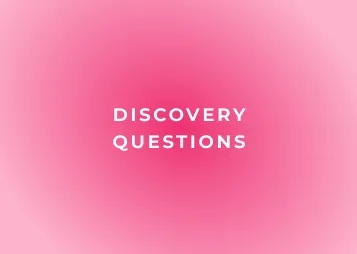60 second summary
Discovery questions are the foundation of every successful SaaS sales process. By asking the right questions, sales teams can qualify leads, uncover pain points, clarify goals, and position solutions more effectively. This guide shares the ultimate list of SaaS discovery questions across six stages: initial discovery, impact discovery, evaluating current providers, during the demo, gathering demo feedback, and closing. Examples include how to uncover metrics that matter, explore friction in current workflows, assess competitor satisfaction, validate solution fit, and identify decision-makers. For Sales Leaders and Account Executives, mastering discovery questioning builds rapport, differentiates your solution, and informs a stronger sales strategy. Use these proven SaaS sales questions to tailor demos, overcome objections, and accelerate deal cycles. Whether you’re new to sales or scaling a high-performing team, these discovery questions help Reps improve qualification, deepen customer conversations, and close more business with the right-fit prospects.
---
Lots of things need to go right for a sale to close.
And while each step in your sales process is important, effective discovery questions really can be the cornerstone of a successful sale.
It sets your sales process off on the right track, helping you uncover valuable insights, build rapport, and tailor your solutions to meet specific customer needs.
In my many years in sales, across a number of SaaS tech businesses, I’ve accumulated some highly effective questions from masters in the game. Here, I’ll share the questions you need to ask to excel in your discovery calls when selling SaaS tech, across six stages of the process:
The importance of effective discovery questioning
Discovery questioning is the process of asking strategic questions to gather information about a prospect's needs, challenges, goals, and current solutions. In my opinion, it is an ongoing exercise that should continue beyond the initial discovery call. It is critical in the sales process for several reasons:
- Builds rapport and trust: By showing genuine interest in the prospect's situation, you build a stronger relationship and establish trust.
- Identifies pain points: Understanding the specific problems the prospect faces allows you to identify if they match your ICP and to provide a more tailored solution that directly addresses their needs.
- Clarifies objectives: Discovery questions help clarify the prospect's goals and objectives, ensuring alignment between their needs and your proposed solution.
- Differentiates your solution: By understanding what the prospect values most, sales reps can highlight the unique features and benefits of their solution.
- Informs strategy: The insights gained from discovery questions inform the sales strategy and help in crafting a compelling value proposition.
Now you’re on board with why they’re so important, let’s jump right into the list.
The ultimate list of discovery questions
Initial discovery
1. Understanding the prospect's interest:
What are the reasons you’re interested in our product/solution?
What problems are you looking to solve?
2. Assessing the current situation:
What metric is suffering as a result of this problem?
What solutions have you tried in the past?
And what did you think of those solutions?
3. Exploring the use case:
What does your [use case] team look like at the moment?
What plans do you have for [use case] team in the future?
What is a typical [use case] process for you?
Are there any friction points in your [use case] process?
4. Identifying priorities:
What are your main priorities for this quarter?
What’s going on in the business that’s making that a priority?
What are the main metrics you need to influence this year?
5. Understanding the problem:
Do you know why this is a problem?
What does a good [use case] process look like to you?
What are your team not doing that you’d like to see happening?
Why do you think that’s not happening?
Impact discovery
6. Assessing the ripple effects:
What are the ripple effects of that across the business?
How is that affecting you personally?
What happens when this issue occurs?
What happens if your [use case team] doesn’t address this problem?
What happens if you do nothing to fix this?
Who else in the business is impacted by this problem?
The current provider
7. Evaluating competitors:
How satisfied are you with your current provider?
What insights do you derive from their solution?
How well do you feel their solution solves the challenges you have mentioned?
What has made you stick with them up until now?
Are there any other providers you feel might solve your problem?
Demo
8. Fitting into the workflow:
Can you see this solution fitting into your workflow?
Would this improve your current process?
Would this help you solve [use case] challenge?
How does this compare to your current process?
9. Team adoption:
Do you see your [use case team] using this?
Do you think this would help you achieve [use case outcome] more effectively?
What excited you most today?
What are the main features that interest you?
What would be the main things you would use [product name] for?
You mentioned your top priority is X - can you see [product name] helping to solve this problem?
Demo response & feedback
10. Validating expectations:
Does this reflect what you had expected to see?
It sounds like you’re excited about this element of the solution, why is that? Is there a story behind that?
What stood out most for you in this solution?
It seems like [X element] took you by surprise, why is that?
11. Gauging concerns:
Is anything missing for you in this solution?
Is there anything you feel like we haven’t covered?
I’m sensing uncertainty in your response - is there anything you are concerned or unsure about?
Closing
12. Blockers and decision-makers:
Are there any blockers that might stop us from getting this solution in place for you?
When would you like to get [product name] in the hands of your team?
Is there anyone else we should involve to get a decision made to implement this solution?
Mastering the art of discovery questioning is essential for SaaS sales teams aiming to close deals and build lasting relationships with good-fit customers. Use this ultimate list of discovery questions to enhance your sales process and achieve greater success in your SaaS sales efforts. I’d love to hear how you get on, so drop me a message to let me know your results.
For more information on the initial discovery call, how to prep for it and how to nail it - check out our guide.
Tom Lavery is the CEO and Co-Founder of Jiminny, the leading conversation intelligence and sales coaching platform that helps companies maximize their revenue. With over 15 years of experience in high-growth VC/PE-backed SaaS companies, Tom was previously SVP at Reward Gateway, now sharing his wealth of knowledge as a speaker in the conversation intelligence space.





.webp)






